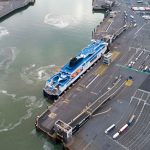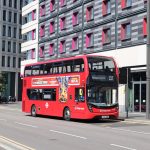Premier Coaches was started seven years ago by new operators, who struggled for a long time to get it into shape. Now, as a routeone Awards finalist, it has achieved much to be proud of
You don't necessarily have to have been going for many years, or be famous as one of the industry's best, to be a very well run coach operator.

One of the well-placed finalists in this year's routeone Awards was Premier Coaches Kintore, a small coach company in Aberdeen that in seven years, has faced many steep learning curves and learned from past mistakes.
As it's a business that keeps its head down, and keeps itself to itself, taking part in the routeone Awards has allowed the company to step back, take a look at itself, and realise just how good it is.
Shona McMasters, the firm's Transport Manager, says: “Someone a couple of years ago said we should enter the local business awards – they said 'what you've achieved is incredible'. When we sit back and look at it, we have achieved an incredible amount.”
A different mindset
Alan Findlater, the Managing Director, is not a typical bus man, but an entrepreneur. When he bought Keirs Coaches in 2010, a 30-year-old business with a poor reputation, it was a case of seeing an opportunity – and he says he was faced with doubt from the wider coach industry. “It was a learning curve,” he says. “We've got our own way of doing things now; we're not interested in what other operators are doing.
“The industry changed around the late '90s, with more legislation, and VOSA became more prominent. But you still get those operators who think 'I don't need to change'. It's an industry mindset.

“A lot of those thinkers have now fallen by the wayside, but from the start, we had to be in it to try and do it right.”
routeone last visited Premier Coaches in early 2014. At that time, it had come through heavily scarred from a daunting Public Inquiry, and was still, to some extent, finding its feet.
Now there is a different feel to the business. It has grown a lot: Now with a 15-vehicle O-Licence, it's planning to increase soon to 18. “People want to use our coaches – they're smart, clean, tidy and new – and we don't like to turn down work, sometimes from our most loyal customers,” says Shona. “People want to associate with us.”
Its premises are smart and professional – helped by Alan's past life as a painter and decorator. Alan now owns the premises outright, and has built a car MoT centre onsite as an extra revenue stream.
The team has also grown. “It was just the two of us in the office last time routeone was here,” says Shona. “We've got an administrator and a bookkeeper too now. A year and a half ago I was still doing the books, and we were growing so fast.”
Driver relationships
The business has also taken on a compliance manager, Tom Gordon, whose role includes looking after the telematics and tracking systems, and managing the drivers.

It’s a good way of getting the best out of the drivers, Shona and Alan say, because Tom has enough time to build up a rapport with them, and can coach them in a friendly, informal way. “Now, if a driver has to come to one of us, he knows it’s serious – whereas Tom is building a relationship with them,” says Shona. “He also has 40 years’ experience in the coach industry, which neither of us has. That makes things easier.”
That’s not to say Alan and Shona don’t have a good relationship with staff: There are now 40 drivers, and Alan takes time to get to know them. “We do want things done in a particular way, but we will thank them for it,” he says, which is as simple as saying “thank you” when they clock out, and greeting them warmly in the mornings.
As a result, drivers’ attitudes have changed. “It doesn’t matter what we do here in the office, we’re at the mercy of the drivers on the road,” says Alan. “They’re promoting the company; they work really hard and they do a really good job. We need to let them know when they’ve done well and thank them.”
Shona says: “The business has changed a lot; it’s a lot for them to change with, but they take massive pride in it, and you can see that pride. We want them to know, ‘you’re a huge part of this’.”
Operator’s manual
The professionalism of the business extends to its thorough operational processes, which, to ensure that it stays on the right side of the Traffic Commissioner, have involved quite a bit of duplication over the years.

To combat that, a different approach is now being taken: Working with a web developer friend, Alan has designed and built his own complete operations management system, which can do everything from generating quotes for customers, to sending out drivers' worksheets, to planning maintenance schedules for the workshop.
It is custom-built for Premier Coaches, but Alan plans to sell it to third parties within the next year. His feeling is that new operators should be able to enter the industry more easily than he did, and that his system – which is called VEMA – can be bought as a kind of new operator's manual.
“If anyone wants to come into the industry and they're not a bus person, why should they be left out of it?” he says. “If they've got the financial standing, and they want to give it a go, it should be a case of 'here you go, that's that' – and we can hand over the complete system.
“We've experienced starting up as an operator, we've made the mistakes, and we know the vulnerabilities.”
Better quality
The company does a good mix of work, with 37 school contracts and a diverse basket of private hire, including airport transfers, and some prestigious oil contracts.

Aberdeen is two years into an economic downturn, which started after the Scottish independence referendum in 2015 and has seen huge job losses in Aberdeen’s massive oil market.
At the time, Premier had “a lot of our eggs in the local authority baskets,” and has benefited to an extent because historically it was not locked into corporate contracts affected by the slump.
Now, by striving to be the best operator in Aberdeen, Premier is growing and growing.
“It’s like if you normally drink house red and you taste a vintage merlot,” says Alan. “Once you’ve experienced that better quality, you’re likely to return to it next time.”
The future
The plan for the future is to continue to grow and get better.
The company has bought six brand new coaches this year in a programme that will continue. They include a Yutong TC9 and a Yutong TC12 from Pelican, two Mercedes-Benz midicoaches, a 19-seater Iveco, and a full-size Bova from Moseley. Investing in the fleet has attracted not only new customers, but new drivers, too.
The premises are owned by the business, and there are plans in place for an ATF and maintenance facility. Planning permission is already in place – it’s just a case of waiting for the council rates to be right. “It’s a slow process, but for this area it will be very beneficial,” says Alan. “There are three options for MoTs in Aberdeen, all in the middle of the city, and with eight HGV firms just on this road, it's an opportunity for us.”
The plans are continuing to use VEMA across the business and make it a complete, marketable product for other start-up operators.
Alan, ever the entrepreneur, has also bought a couple of other businesses this year – including a gym and tapas restaurant – in order to diversify financially. Those are run by their own management teams. “The other businesses are just about spreading our wings,” says Alan. “The coach business is very much my baby.”
Most importantly, the growth needs to take into account the needs of the staff, and Alan and Shona want to maintain their personal relationships with drivers. “It’s something to be careful of as we get bigger,” says Shona. “Strengthening and maintaining ‘Team Premier’ is vital to the continued growth and success of the company, and our relationship with all the staff is key to this.”
























